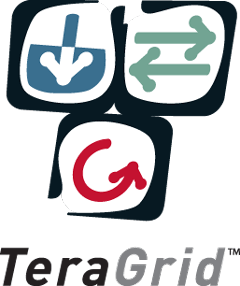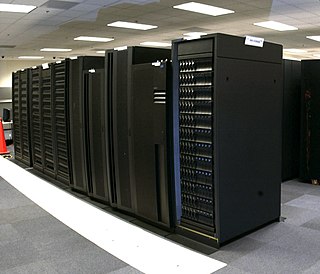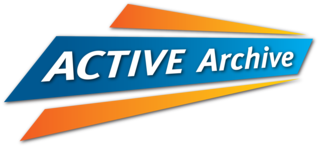Related Research Articles
Tandberg Data GmbH is a company focused on data storage products, especially streamers, headquartered in Dortmund, Germany. They are the only company still selling drives that use the QIC and VXA formats, but also produce LTO along with autoloaders, tape libraries, NAS devices, RDX Removable Disk Drives, Media and Virtual Tape Libraries.
Cray Inc., a subsidiary of Hewlett Packard Enterprise, is an American supercomputer manufacturer headquartered in Seattle, Washington. It also manufactures systems for data storage and analytics. Several Cray supercomputer systems are listed in the TOP500, which ranks the most powerful supercomputers in the world.
Quantum Corporation is a data storage, management, and protection company that provides technology to store, manage, archive, and protect video and unstructured data throughout the data life cycle. Their products are used by enterprises, media and entertainment companies, government agencies, big data companies, and life science organizations. Quantum is headquartered in San Jose, California and has offices around the world, supporting customers globally in addition to working with a network of distributors, VARs, DMRs, OEMs and other suppliers.
In information technology, a backup, or data backup is a copy of computer data taken and stored elsewhere so that it may be used to restore the original after a data loss event. The verb form, referring to the process of doing so, is "back up", whereas the noun and adjective form is "backup". Backups can be used to recover data after its loss from data deletion or corruption, or to recover data from an earlier time. Backups provide a simple form of disaster recovery; however not all backup systems are able to reconstitute a computer system or other complex configuration such as a computer cluster, active directory server, or database server.

Linear Tape-Open (LTO), also known as the LTO Ultrium format, is a magnetic tape data storage technology used for backup, data archiving, and data transfer. It was originally developed in the late 1990s as an open standards alternative to the proprietary magnetic tape formats that were available at the time. Upon introduction, LTO rapidly defined the super tape market segment and has consistently been the best-selling super tape format. The latest generation as of 2021, LTO-9, can hold 18 TB in one cartridge.

The NASA Advanced Supercomputing (NAS) Division is located at NASA Ames Research Center, Moffett Field in the heart of Silicon Valley in Mountain View, California. It has been the major supercomputing and modeling and simulation resource for NASA missions in aerodynamics, space exploration, studies in weather patterns and ocean currents, and space shuttle and aircraft design and development for almost forty years.

Storage Technology Corporation was a data storage technology company headquartered in Louisville, Colorado. New products include data retention systems, which it calls "information lifecycle management" (ILM).

TeraGrid was an e-Science grid computing infrastructure combining resources at eleven partner sites. The project started in 2001 and operated from 2004 through 2011.
PowerVault is a line of data storage and backup products formerly from Dell, and currently for Dell EMC.

Overland Storage is a wholly owned subsidiary of Sphere 3D Corp. It has acquired Tandberg Data shortly before being acquired by Sphere 3D itself. The two subsidiaries were later rebranded under the common Overland-Tandberg brand.
Magnetic-tape data storage is a system for storing digital information on magnetic tape using digital recording.

The IBM Storage product portfolio includes disk, flash, tape, NAS storage products, storage software and services. IBM's approach is to focus on data management.
Qualstar Corporation is an American manufacturer of magnetic tape data storage products, based in Simi Valley, California. It was founded in 1984 as a 9-track tape drive manufacturer, and now makes tape library products. The company sold its last 9-track tape drive in 2006 and as of March 2006 has sold all remaining parts inventory to Vinastar, an aftermarket vendor.
High Performance Storage System (HPSS) is a flexible, scalable, policy-based, software-defined Hierarchical Storage Management product developed by the HPSS Collaboration. It provides scalable hierarchical storage management (HSM), archive, and file system services using cluster, LAN and SAN technologies to aggregate the capacity and performance of many computers, disks, disk systems, tape drives, and tape libraries.

The National Computational Infrastructure is a high-performance computing and data services facility, located at the Australian National University (ANU) in Canberra, Australian Capital Territory. The NCI is supported by the Australian Government's National Collaborative Research Infrastructure Strategy (NCRIS), with operational funding provided through a formal collaboration incorporating CSIRO, the Bureau of Meteorology, the Australian National University, Geoscience Australia, the Australian Research Council, and a number of research intensive universities and medical research institutes.
SC, the International Conference for High Performance Computing, Networking, Storage and Analysis, is the annual conference established in 1988 by the Association for Computing Machinery and the IEEE Computer Society. In 2019, about 13,950 people participated overall; by 2022 attendance had rebounded to 11,830 both in-person and online. The not-for-profit conference is run by a committee of approximately 600 volunteers who spend roughly three years organizing each conference.
The Linear Tape File System (LTFS) is a file system that allows files stored on magnetic tape to be accessed in a similar fashion to those on disk or removable flash drives. It requires both a specific format of data on the tape media and software to provide a file system interface to the data.

The Active Archive Alliance is a trade association that promotes a method of tiered storage. This method provides users access to data across a virtual file system that migrates data between multiple storage systems and media types including solid-state drive/flash, hard disk drives, magnetic tape, optical disk, and cloud. The result of an active archive implementation is that data can be stored on the most appropriate media type for the given retention and restoration requirements of that data. This allows less time sensitive or infrequently accessed data to be stored on less expensive media and eliminates the need for an administrator to manually migrate data between storage systems. Additionally, since storage systems such as tape libraries have low power consumption, the operational expense of storing data in an active archive is significantly reduced.

Chelsio Communications is a privately held technology company headquartered in Sunnyvale, California with a design center in Bangalore, India. Early venture capital funding came from Horizons Ventures, Invesco, Investor Growth Capital, NTT Finance, Vendanta Capital, Abacus Capital Group, Pacesetter Capital Group, and New Enterprise Associates. A third round of funding raised $25 million in late 2004. LSI Corporation was added as investor in 2006 in the series D round. By January 2008, a $25M financing round was announced as series E. In 2009, an additional $17M was raised from previous investors plus Mobile Internet Capital.
The Cheyenne supercomputer at the NCAR-Wyoming Supercomputing Center (NWSC) in Cheyenne, Wyoming began operation as one of the world’s most powerful and energy-efficient computers. Ranked in November 2016 as the 20th most powerful computer in the world by Top500, the 5.34-petaflops system is capable of more than triple the amount of scientific computing performed by NCAR’s previous supercomputer, Yellowstone. It also is three times more energy efficient than Yellowstone, with a peak computation rate of more than 3 billion calculations per second for every watt of energy consumed.
References
- ↑ "Spectra Logic".
- ↑ "Spectra Logic Finds Niche in High-End Tape Storage".
- ↑ "Nathan C. Thompson".
- ↑ "Nathan C. Thompson[:] Chief Executive Officer". Spectra Logic. Retrieved 2016-08-02.
Nathan C. Thompson is the CEO of Spectra Logic Corporation, a company that originally began as Western Automation back in 1979.
- ↑ "Storage Notes: Every ISP Will Need a Tape Library".
- ↑ "Spectra Logic enables iSCSI on tape libraries".
- ↑ "Spectra gets backup encryption right".
- ↑ "Spectra Logic:Taking Tape to Infinity".
- ↑ "Spectra Logic Reigns Supreme".
- ↑ "Spectra Logic gets midrange and enterprise tape storage systems awards".
- ↑ "DCIG, LLC Announces Big Data Tape Library Buyers Guide". The San Francisco Chronicle.
- ↑ "Spectra Logic Tape Storage Beefs Up NCSA Blue Waters Supercomputer".
- ↑ "Active Archive Alliance Formed to Promote Simplified, Online Access to All Archived Data".
- ↑ "Spectra Logic Finds Niche in High-End Tape Storage".
- ↑ "Spectra Logic Scores Data Archive Wins as HPC Market Gets "Greener"".
- ↑ "Spectra Logic Announces Plans to Make LTO-7 Technology Available in Spectra Tape Libraries".